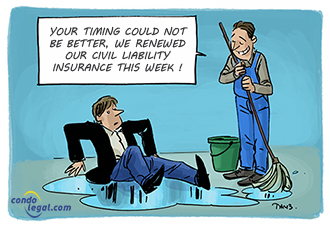Civil liability insurance of the syndicate
 A syndicate is likely to incur civil liability towards co-owners but also third party members; this liability can be illustrated by the financial contribution of the co-owners because in the event of a judgment condemning the syndicate to pay a sum of money, this judgment will be enforceable against him and each person who was a co-owner at the time the cause of action arose. This is why the law obliges every syndicate of co-owners to take out insurance covering its civil liability.
A syndicate is likely to incur civil liability towards co-owners but also third party members; this liability can be illustrated by the financial contribution of the co-owners because in the event of a judgment condemning the syndicate to pay a sum of money, this judgment will be enforceable against him and each person who was a co-owner at the time the cause of action arose. This is why the law obliges every syndicate of co-owners to take out insurance covering its civil liability.
Object of the coverage
The civil liability insurance of the syndicate is essential and so, as much as for the co-ownership than the co-owners themselves; it offers a protection to the latter when their liability is incurred collectively towards third party members but also against co-owners or other occupants of the immovable.
The insurance subscribed by the syndicate covers the risks associated with the common portions of the building (examples: inadequate snow removal of a sidewalk, slippery stairs, etc.) or damages caused by its employees (examples: janitor and condo manager) in the performance of their tasks. Also, in the event of a legal recourse regarding the civil liability of the syndicate, the insurer would be able to assume its defence; this coverage serves to pay the professional fees of lawyers and other court fees but as it is the case with any insurance policy, exclusions exist.
Amount of the coverage
The insurer must indicate the amount of the coverage in the civil liability insurance policy of the syndicate; indeed, it's possible that the declaration of co-ownership imposes a minimum amount of money as coverage.
Exclusions
In addition to the usual exclusions, the civil liability insurance of the syndicate generally excludes any damages resulting from insufficient coverage in the insurance contract; for instance, it could consist of an insurance insufficiency resulting from a declared value inferior to the reconstruction cost of the building. In this case, if the immovable has to be rebuilt in totality or partially following a loss, each co-owner will have to contribute financially to cover the difference between the indemnity paid by the insurer and the reconstruction cost.
Failure to insure the syndicate of civil liability
The failure to subscribe civil liability insurance coverage can have serious consequences for the syndicate, the co-owners individually as well as the members of the board of directors. First of all, if the syndicate is sued and must indemnify the victim having suffered a prejudice, it will support on its own the legal fees and all court costs. Second of all, even though a syndicate has its own patrimony, the law states that if a judgment is rendered against it, the financial liability of the co-owners is engaged at least for a portion; it's important to note that the party who has a judgment against the syndicate can execute it against each person who was an owner of a private portion at the time when the cause of action arose and so, proportionally to the relative value of his fraction. Finally, directors are personally liable if they do not act with prudence and diligence in the accomplishment of their mandate.
 WHAT YOU SHOULD KNOW! Having a pool in the immovable increases the risk regarding the civil liability of the syndicate; in all circumstances, this insurance coverage must be of at least two million dollars.
WHAT YOU SHOULD KNOW! Having a pool in the immovable increases the risk regarding the civil liability of the syndicate; in all circumstances, this insurance coverage must be of at least two million dollars.
 WHAT TO KEEP IN MIND: In all cases, the board of directors should retain the services of a competent insurance professional who will be able to suggest an adequate amount of coverage concerning the risks.
WHAT TO KEEP IN MIND: In all cases, the board of directors should retain the services of a competent insurance professional who will be able to suggest an adequate amount of coverage concerning the risks.
 WARNING! The civil liability insurance coverage of the syndicate is to be distinguished from the directors' liability insurance.
WARNING! The civil liability insurance coverage of the syndicate is to be distinguished from the directors' liability insurance.
Back to the factsheet: Insurances of the syndicate